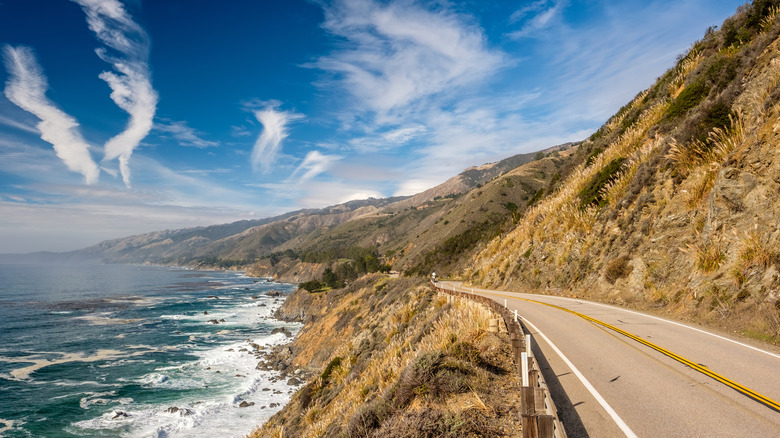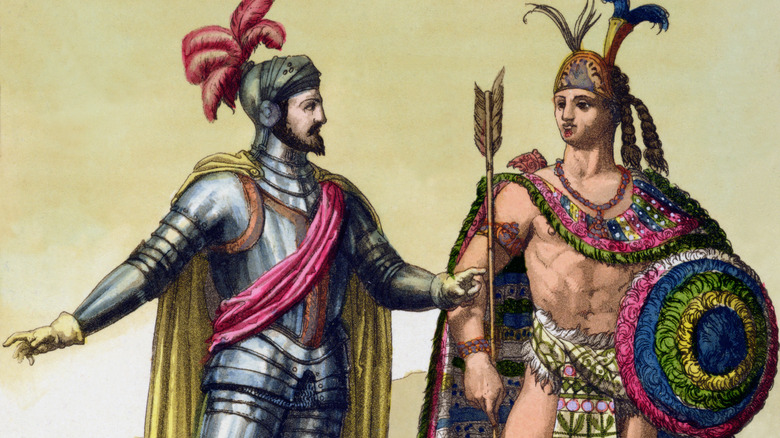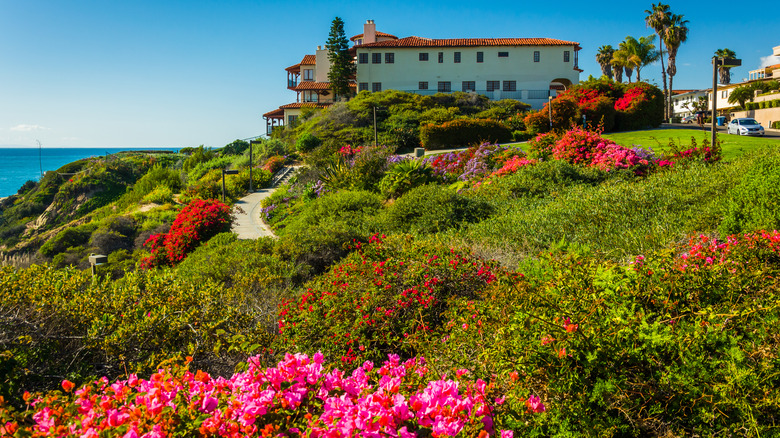The Likely Literary Inspiration Behind California's Name
California has always been a place that inspires dreams and visions: palm trees and Hollywood Boulevard; a slow drive along the Pacific Coast Highway from Los Angeles to San Francisco; vineyards and the late 1840s gold rush. And the state's name? At first glance, you might think the name is Spanish, like Nevada ("covered in snow"), Montana (possibly meaning "mountainous"), or Florida ("feast of flowers"). Or you might think it's Native American, like Connecticut, Massachusetts, Alabama, and over 20 more (via the U.S. Department of the Interior's Bureau of Indian Affairs).
As reasonable as those assumptions sound, we've actually got an unlikely suspect to thank for the name of the U.S.' most idealized, sun-radiant state: a book. Not that California may be named after a book's title, but rather a character and place: Queen Calafia of California. It's as though someone read "Harry Potter" and liked it so much that they decided to name a real-world nation "Dumbledoria." Such is the power of storytelling.
The book in question? The Spanish chivalric romance "Las Sergas de Esplandián," or "The Exploits of Esplandián," by Garcí Rodríguez de Montalvo, via The California Frontier Project. Motalvo's book was published in Seville, Spain, in 1510, the year before Hernán Cortés' first military expedition to Cuba in 1511. By 1519, Cortés and other Spanish conquistadors landed in Mexico, and come 1540, the Baja peninsula was commonly called "California." Many believe the name comes from the land of Queen Calafia described in Motalvo's book.
Dreams of chivalric heroes
The writer of "Las Sergas de Esplandián," Garcí Rodríguez de Montalvo, wrote some of the most famous book series of his time, particularly those featuring his most popular recurring character, Don Amadis of Gaul, as The California Frontier Project discusses. Don Amadis was a medieval knight who sallied forth on adventures, fought villains, rescued fair damsels and all that, and was one of the paragons of the "chivalric romance" genre of fiction.
By "romance" we don't mean one of those Harlequin romance novels with pictures of abs on the cover. A romance differs from its successor, the novel, because it's not trying to resemble the real world or depict people how they really behave, as Washington State University outlines. Historically, romances are full of fantasy, like tales of King Arthur, and heroic monologues about virtue, valor, and the like. Novels didn't take off until 1615's "Don Quixote" by Miguel de Cervantes, which ingeniously featured an old man driven delusional by reading so many chivalric romances.
These are the books that Hernán Cortés and other conquistadors were consuming while heading off to plant the Spanish flag here and there in the New World. Much like a modern Marvel fan finding ways to insert Iron Man memes into everything, the conquistadors of 500 years ago might have landed in Mexico, looked around and said, "Whoa! This is just like in my book! It's California, the land of Queen Calafia!"
Cortés drops anchor at Tabasco
Even those with no knowledge of history can guess at how the Cortés story goes from here: bad for the indigenous people, good for the plate-armored conquerors. When Cortés landed on Cuba in 1511 he was a mere soldier in the ranks of fellow senior conquistador Diego Velázquez. As History relates, Cortés was given his own command, got ready to head to Mexico, had his expedition cancelled by Velázquez, and went anyway; he dropped anchor in Tabasco in 1519. The Aztecs repelled him from their land, but he went back and took their capital, Tenochtitlan, in 1521.
Even back then, the spell of California — a magical land of beauty and wealth — was apparently alive and thriving. When Cortés' and his soldiers first saw Tenochtitlan, they thought of Montalvo's chivalric romances. One of Cortés' soldiers, Bernal Diaz de Castillo, said, "We were amazed. We said it looked like the enchanted things they tell of in the book of Amadis" (via The California Frontier Project). Tenochtitlan's wealth played a big role in this, as the land of Queen Calafia in "Las Sergas de Esplandián" was described as an island paradise full of riches (via History). Plus, without further geographical knowledge, Cortés and his men simply assumed they'd landed on an island. It took until 1602 for explorers to realize that the Baja peninsula south of modern-day San Diego was connected to the North American continent.
A tale going back to Charlemagne
The tale of the name of California might have roots even deeper than Garcí Rodríguez de Montalvo and his chivalric romances, all the way back to the Frankish king Charlemagne, the "Father of Europe." Charlemagne rose to power in the late eighth century as one of the European subcontinent's first unifying, medieval kings, and was widely known as an extremely pious, God-fearing person.
Lots of tales were written about Charlemagne, most notably the 11th-century epic poem "The Song of Roland," one of the first pieces of extant literature written in the Anglo-Norman French language (via The Collector). "The Song of Ronald" is a chivalric tale of honor, warfare, and betrayal told from the perspective of Roland, a knight in the court of Charlemagne. As The California Frontier Project explains, Charlemagne lists his enemies in one part of the poem, saying, "Against me then the Saxon will rebel / Hungar, Bulgar, and many hostile men / Romain, Puillain, all those are in Palerne / And in Affrike, and those in Califerne."
Notice the "Califerne" at the end? It was derived from the Arabic word for a type of fortified city called a "kalaa" or "kalat." Around the time "The Song of Roland" was written, there was a city along the North African coast in modern-day Algeria called "Kalaa-Ifrene" or "Kal-Ifrene." As an educated, literate person, Montalvo would have definitely been familiar with "The Song of Roland," and might have used "Califerne" to inspire his own California.
The Queen of Calafia
In an excerpt from "Las Sergas de Esplandián" the California State University quotes, "Know that to the right hand of the Indies was an island called California, very near to the region of the Terrestrial Paradise, which was populated by Black women, without there being any men among them, that almost like the Amazons was their style of living." Garcí Rodríguez de Montalvo goes on to describe the women of California as having "vigorous bodies," "great strength," and "strong and ardent hearts." Their weapons were also gold, and they tamed and raised all sorts of mythical creatures like griffons.
Montalvo also describes the Amazons' Queen Calafia as "a queen great of body, very beautiful for her race, at a flourishing age, desirous in her thoughts of achieving great things, valiant in strength, cunning in her brave heart, more than any other who had ruled that kingdom before her."
The key thing to note here is that Queen Calafia and her Amazons were described as Black. Some folks in the present have taken this whole story, possibly inspired by Califerne in Algeria from "The Song of Roland," and which possibly went on to inspire some Spanish conquistadors, as emblematic of the modern Black American experience. In 2021, the Antenna Theater of San Rafael, for instance, put on a theatrical performance showcasing Queen Calafia, saying that she had "stepped off her boat and onto California soil for the first time in hundreds of years," as KQED describes.
Alternative name theories
In the end, despite all these wonderful tales that make for a great story, we actually can't be 100% sure that California comes from Garcí Rodríguez de Montalvo's chivalric romance, "Las Sergas de Esplandián." Sure, it definitely looks like it, but there's no proof positive document saying, "We conquistadors hereby decree that this peninsula be named after this really cool book we all read on the boat on the way here from Spain."
There are in fact competing theories about the name of California, some of which are simpler and common-sense enough to be more plausible than Montalvo's writings. One such theory involves the Spanish word for hot, "caliente." As The California Frontier Project says, some suspect that California comes from "caliente horno" in Spanish, or "hot furnace," which if you twist your mouth just right does sound a bit like California. In Latin the pronunciation is more similar: "caliente fornax." Yet another theory claims that California is a word from a Native American tribe. In the book "Testimonios: Early California Through the Eyes of Women, 1815–1848," a compilation of oral histories gathered from Californian pioneer women, one interviewee said that California is a native word that translates into "high hill."
In a way, all of these stories are right in that they exemplify California's odd mystique and allure. Whether it's the high hills of Hollywood, the valleys of Sonoma, or the promise of beauty and wealth in a far-flung land, California has always seemed to inspire.





